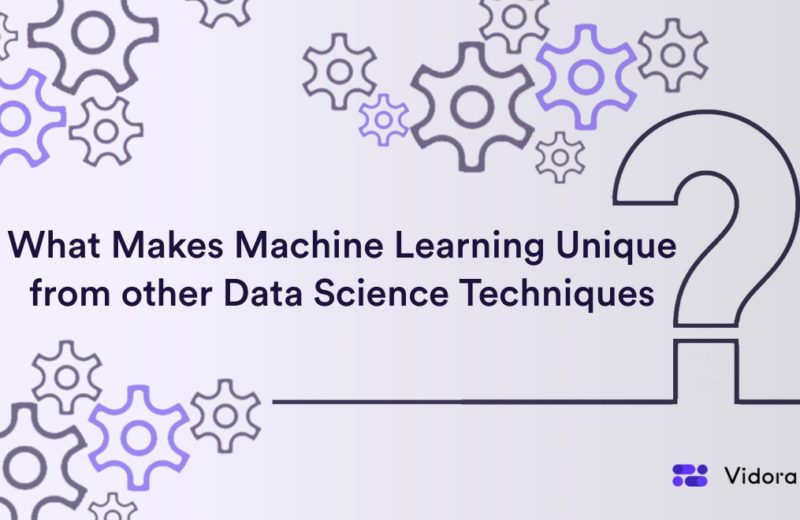
Machine learning falls under the general umbrage of data science. And yet, the term machine learning is used so much that it could very well deserve its own category. In this blog post we will highlight what makes machine learning unique among data science techniques and discuss how those unique aspects drive tremendous value for enterprises.
Before we discuss machine learning, let’s start with a few general definitions. The definitions below are how Vidora sees these terms typically used within enterprise companies. These definitions differ somewhat from their dictionary definitions.
- Data Science – The manipulation of data to produce insights and graphs which are used to monitor and provide visibility to organizational processes. Typically this involves data scientists analyzing data to produce insights for various business units and executives.
- Predictive Analytics – The use of current and historical data to make predictions about the future. In general predictive analytics leverages predictive models like neural networks and decision trees to make predictions. Predictive analytics can often be used as part of a one-time analysis for a data science project.
- Machine Learning – Machine learning also uses current and past data to make predictions. And machine learning also uses models like neural networks and decision trees to make predictions. The key difference between machine learning and predictive analytics (as these terms are used by most businesses) is that machine learning technology is continually adapting and adjusting to new data, while predictive analytics technology is typically used in a more static fashion for a one-time analysis.
In summary, the unique aspects of machine learning is that it continually learns and adapts based on the latest data. Why is this continually learning and adaptation so valuable for companies?

Various types of machine learning models available within Vidora’s no-code machine learning platform Cortex.
Machine Learning Benefit #1 – “Set It and Forget It”
A tremendous benefit of machine learning technology is that once a machine learning model is setup and running, no more work is required. The machine learning algorithm will continually adapt to new data on its own. Typically what’s needed to setup a machine learning model is input data, an output location, and the model goal. Machine learning takes care of the rest. At Vidora we have several models that have been running for years.
Machine Learning Benefit #2 – Adapt Quickly to Changing Market Conditions
2020 has taught us that markets can change quickly. Machine learning is well suited to adapt to changing market conditions. As the input data changes for the model, it adapts and learns how to adapt that data for the goals specified by the business. We wrote a recent blog post on how machine learning helps organizations adapt to changing market conditions.
Machine Learning Benefit #3 – Automate Business Tasks
Machine learning pipelines, because of their adaptability, can be used to automate key organizational tasks. Within marketing teams these tasks can range from when to send a user a push notification to how much to price a subscription paywall for an individual user. The machine learning algorithm will ensure that the experience for each user is optimized.
Machine Learning for the Win
Machine learning is a cutting edge area of data science with the ability to provide real and sustained value for organizations. The key to the success of machine learning is its ability to continually adapt to changing markets while simultaneously ensuring the business is seeing the best possible outcomes. Used correctly, machine learning has the ability to transform the large organizational investments in data into revenue and ROI.


